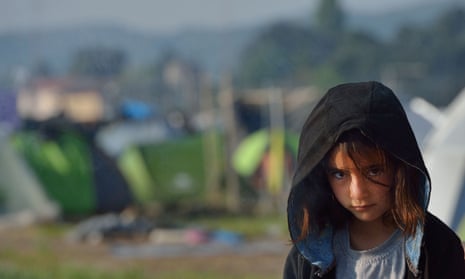A few weeks ago I heard a story about a child turning up at a school near a refugee camp and being turned away because there was no chair for her. She came back the next day with a broken chair and asked again. I can’t remember where I heard the story but it’s melded with all the other things I’ve heard over the last few months about refugee families and lone children.
The ideas and images have been running in my blood like a fever. But this week, with the government’s response to children utterly alone in the world (when the Conservative party voted against the UK accepting 3000 unaccompanied child refugees from Syria) I couldn’t ignore the story burning in my veins. All other work had to be put aside. So rough and ready as it is, here is my response to their policy:
The Day the War Came
The day war came there were flowers on the window sill
and my father sang my baby brother back to sleep.
My mother made my breakfast, kissed my nose
and walked with me to school.
That morning I learned about volcanoes, I sang a song about how tadpoles turn at last to frogs.
I made a picture of myself with wings.
Then, just after lunch, while I watched a cloud shaped like a dolphin, war came.
At first, just like a spattering of hail
a voice of thunder…
then all smoke and fire and noise, that I didn’t understand.
It came across the playground.
It came into my teacher’s face.
It brought the roof down.
and turned my town to rubble.
I can’t say the words that tell you
about the blackened hole that had been my home.
All I can say is this:
war took everything
war took everyone
I was ragged, bloody, all alone.
I ran. Rode on the back of trucks, in buses;
walked over fields and roads and mountains,
in the cold and mud and rain;
on a boat that leaked and almost sank
and up a beach where babies lay face down in the sand.
I ran until I couldn’t run
until I reached a row of huts
and found a corner with a dirty blanket
and a door that rattled in the wind
But war had followed me.
It was underneath my skin,
behind my eyes,
and in my dreams.
It had taken possession of my heart.
I walked and walked to try and drive war out of myself,
to try and find a place it hadn’t reached.
But war was in the way that doors shut when I came down the street
It was in the way the people didn’t smile, and turned away.
I came to a school.
I looked in through the window.
They were learning all about volcanoes
And drawing birds and singing.
I went inside.
My footsteps echoed in the hall
I pushed the door and faces turned towards me
but the teacher didn’t smile.
She said, there is no room for you,
you see, there is no chair for you to sit on,
you have to go away.
And then I understood that war had got here too.
I turned around and went back to the hut, the corner and the blanket
and crawled inside.
It seemed that war had taken all the world and all the people in it.
The door banged.
I thought it was the wind.
But a child’s voice spoke
“I brought you this,” she said “so you can come to school.”
It was a chair. A chair for me to sit on and learn about volcanoes, frogs and singing
And drive the war out of my heart.
She smiled and said “My friends have brought theirs too, so all the children here can come to school”
Out of every hut a child came and we walked together,
on a road all lined with chairs.
Pushing back the war with every step.

Jackie’s beautiful illustration of a sad empty chair has prompted a Twitter campaign #3000chairs where illustrators, artists and ANYONE who wants to join in is invited to draw/paint/sketch an empty chair and post it on Twitter using #3000chairs. Use the hashtag to see the hundreds that have already been posted – and look out on the Guardian children’s books site for a gallery of empty chair highlights soon.
